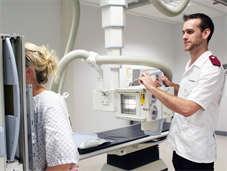X-ray
An x-ray is a painless way of using a type of radiation to take two-dimensional pictures of your organs and bones to find out where the problem is.
What is it used for?
It can show abnormal areas in your body such as tumours and bone problems. If you have a contrast dye at the same time, the x-ray will also highlight things such as your blood vessels as the dye moves through them.
Mammography and angiography are types of x-ray.
Do I need to prepare?
You do not usually need to prepare for an x-ray. If you do need to prepare, your key worker will explain what to do.
What happens during the procedure?

You may lie on a table or stand against a flat surface so the part of your body being examined is between the x-ray machine and a photographic plate.
The x-ray itself lasts for a fraction of a second but the whole procedure may take between 30 and 60 minutes.
Before the test you may be asked to drink a liquid or you may be given an enema or injection containing a dye (contrast medium) that makes your organs or blood vessels show up more clearly. The dye is harmless and will pass out of your body in your urine.
In rare cases it can cause an allergic reaction, so the radiologist will ask you if you have had an allergic reaction to contrast medium in the past or if you have any other allergies. A reaction is usually easily treated with medication.
Go to www.nhs.uk for more information about x-rays.
Contact us
If you have any queries about your x-ray please contact us on the relevant phone number below:
Radiology at King’s College Hospital: 020 3299 3111
Radiology at Princess Royal University Hospital: 01689 863642 / 01689 863673 / 01689 863674 / 01689 863675
Radiology at Orpington Hospital: 01689 865100
Radiology at Beckenham Beacon: 01689 866677
